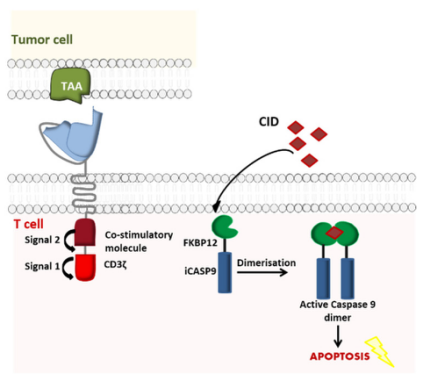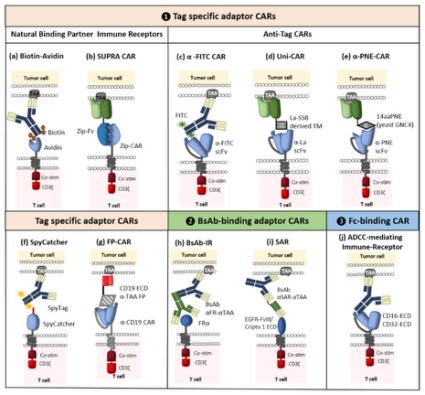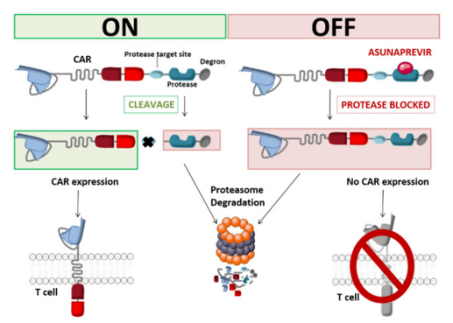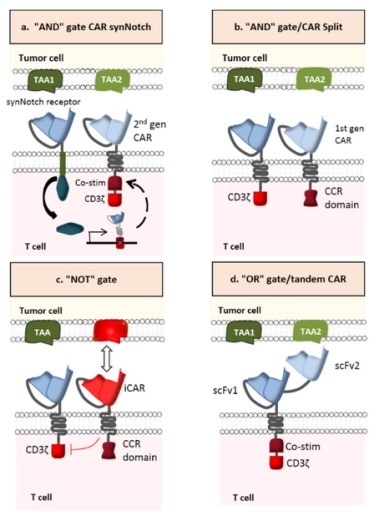With the increasing use of CARTs, it is important to understand their unique side effects. The key challenge for CARTs' successes is that potent systemic immune activation drives the life-threatening toxicity of cytokine release syndrome (CRS). CAR is composed of modular components, and the optimal molecular design of CAR can be achieved through many changes in the constituent protein domains. Therefore, it is necessary to develop CAR design beyond conventional structures to overcome these limitations and expand the use of CAR-T cells to a wider range of malignancies.
Creative Biolabs provides a comprehensive review of the most promising CAR-T cell safety strategies and is committed to providing novel CAR design services, and CAR-T cell modification services to support CRS toxicity management. We provide a variety of safety strategies to achieve limited CRS toxicity, including but not limit to integrating external components (such as OFF and ON switch CAR) or combining OR-, AND- and NOT-gate CAR-T cells to target multiple antigens, or introducing small molecules adaptors to CAR-modified T cells to control excessive activation. These next-generation CARs have laid the foundation for developing novel therapeutic CAR-T cells.
Inducible caspase-9 (iCasp9) is a novel suicide gene model and has now been integrated into CAR-T cell therapy. In this novel model, iCasp9 is merged to the transduced CAR-T cell as a homodimer and shows a high affinity for a chemical inducer of dimerization (CID) AP1903. AP1903 can be administered following CAR-T cell administration. Once the CID has been injected, it causes iCasp9 dimerization and thus activates the caspase and induces the apoptosis of the CAR-T cells.

Fig.1 Activation of iCasp9 induces the death of transduced cells.1
Another way to overcome potential toxicity is to develop therapeutic lymphocytes expressing an "ON-switch". Instead of eliminating overreacting CAR-T cells that cause life-threatening conditions, the use of an activating "switch-on" molecule enables the precise remote control of these cells in terms of timing, site of action, and dosage. Adaptor switchable CARs are introduced to the ON-Switch CARs and designed to improve the flexibility, tumor specificity, and controllability of CAR-T cells. Creative Biolabs provides diverse adaptor CAR platforms including but not limited to: Tag-specific adaptor CARs, bispecific antibody (bsAb)-binding adaptor CARs, and constant fragment (Fc)-binding adaptor CARs

Fig.2 Schematic representation of switchable adaptors.1
Another strategy is Small Molecule Assisted shutoff (SMASh), which provides reversible control of CAR production by turning off the cytolytic properties of genetically engineered lymphocytes. The CAR construct, also known as the switch-off CAR (SWIFF-CAR), binds to the drug-sensitive viral protease and degron (protein destabilizing component) of the CAR. In the absence of specific small-molecule drugs, degron is excised from the CAR, thereby exposing the antigen-targeted scFv on the surface of CAR-T cells. When the drug was added to the culture medium, the cleavage of degron catalyzed by the viral protease was inhibited. Therefore, the SWIFF-CAR system allows CAR to be degraded through the proteolytic pathway of T cells without depleting the cells. Their reversibility, continuous control, and cost-effectiveness are attractive features.

Fig.3 Principle of the SWIFF-CAR.1
Multi-antigen-targeted "AND", "OR", and "NOT" Gate CARs are novel strategies for eliminating on-target off-tumor toxicity. Creative Biolabs provides various types of gate CARs based on the signal transmission pattern: dual CAR-T cells, tandem CAR-T cells, trivalent CAR-T cells, and pooled CAR-T cells.

Fig.4 Schematic representation of "AND", "OR", and "NOT" gate CARs.1
If you are interested in our services, please send an email to contact us, and our team will get back to you as soon as possible.
Reference
For any technical issues or product/service related questions, please leave your information below. Our team will contact you soon.
All products and services are For Research Use Only and CANNOT be used in the treatment or diagnosis of disease.
 NEWSLETTER
NEWSLETTER
The latest newsletter to introduce the latest breaking information, our site updates, field and other scientific news, important events, and insights from industry leaders
LEARN MORE NEWSLETTER NEW SOLUTION
NEW SOLUTION
CellRapeutics™ In Vivo Cell Engineering: One-stop in vivo T/B/NK cell and macrophage engineering services covering vectors construction to function verification.
LEARN MORE SOLUTION NOVEL TECHNOLOGY
NOVEL TECHNOLOGY
Silence™ CAR-T Cell: A novel platform to enhance CAR-T cell immunotherapy by combining RNAi technology to suppress genes that may impede CAR functionality.
LEARN MORE NOVEL TECHNOLOGY NEW SOLUTION
NEW SOLUTION
Canine CAR-T Therapy Development: From early target discovery, CAR design and construction, cell culture, and transfection, to in vitro and in vivo function validation.
LEARN MORE SOLUTION